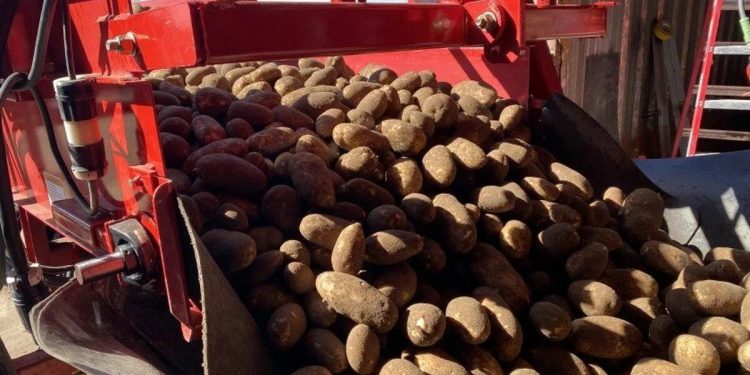#Agriculture #PotatoGlut #PacificNorthwest #FarmingCrisis #FoodSustainability #AgriculturalEconomics #CropManagement #FoodWasteManagement #CommunityCollaboration
Northwest farmers find themselves in a predicament as a surplus of high-quality french-fry-making potatoes inundates the region. Despite being a bountiful year for spud cultivation, the excess harvest has led to an unprecedented potato glut. With 165,000 tons of potatoes at risk of going to waste, farmers and industry experts are grappling with the economic and logistical challenges of managing this surplus.
In the agricultural heartland of the Pacific Northwest, an unexpected crisis has emerged: a surplus of premium french-fry-making potatoes, creating a dilemma for farmers, agronomists, and agricultural engineers alike. Dale Lathim, President of the Potato Marketing Association of North America, laments the situation, highlighting the economic and psychological toll this surplus has taken on the farming community.
This year, the Northwest experienced a remarkable potato harvest, surpassing the expectations of farmers. However, this abundance has led to a staggering glut, resulting in approximately 165,000 tons of potatoes needing to be dealt with urgently. Originating from Washington, Oregon, Idaho, and Alberta, these surplus potatoes have overwhelmed the region.
The crisis stems from a unique set of circumstances. Following two years of shortages in the industry, farmers took a proactive approach and planted an additional 55,000 acres of potatoes. The anticipation of a high demand market fueled this decision, but unfortunately, the surplus exceeded even the rosiest projections. As a consequence, farmers have been compelled to dispose of their excess yield, a process that comes with substantial costs. Not only do these surplus potatoes require harvesting and transportation, but leaving them unattended can lead to diseases, rot, and insect infestations.
Efforts to address this surplus are further complicated by the impending challenges for the following year. Major potato processors have already warned growers of a 10% reduction in purchases for 2024, exacerbating the current crisis. The surplus is so immense that even local food banks struggle to absorb the excess, underscoring the urgency of finding sustainable solutions.
Despite the challenges, there is a glimmer of hope. Dale Lathim and industry stakeholders are exploring avenues to salvage the situation. Lathim has offered to coordinate pickups with Northwest food banks willing to accept the surplus potatoes, demonstrating the community’s determination to minimize waste and support those in need.
The potato glut in the Pacific Northwest serves as a stark reminder of the complexities within the agricultural industry. Unforeseen circumstances, coupled with market fluctuations, can lead to unexpected challenges for farmers and stakeholders. While the current surplus poses significant difficulties, the resilience and cooperative spirit of the agricultural community offer hope for finding innovative solutions. By fostering collaboration between industry players, farmers, and local organizations, the Northwest can navigate this crisis, mitigating waste and ensuring a sustainable future for all involved.







